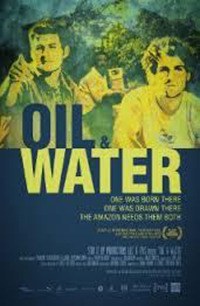by Shannon Borg
Special to the Sounder
Although the new documentary “Oil and Water,” directed by two Seattle filmmakers and showing at the Orcas Island Film Festival from Oct. 10 to 13, partially takes place along the Amazon, this movie tracing the coming-of-age of two young men into the world of social awareness, big oil and environmental activism couldn’t be more connected to the San Juan Islands and the waters of the Salish Sea that surround us.
On one hand, there’s Hugo Lucitante, who was just 10 years old when he came to the U.S. to attend school. He hopes to eventually return to his homeland, which has been contaminated by over 18 billion gallons of spilled crude oil over decades. Little did he know that he would become the voice of his threatened Ecuadorian Cofan culture. On the other hand, there’s David Porvitz, an Amherst, Massachusetts sixth grader, who confronts a modern-day Goliath, hoping to introduce the idea of “fair trade” to the oil industry. The film begins as both boys graduate from high school and begin their journeys through the bureaucracy of immigration and corporate boardrooms, economic hardship and personal choices.
Both want to live in a world that is clean, peaceful and free from economic and environmental threats.
Producers Laurel Spellman-Smith and Francine Strickwerda’s timely film examines the connections between these young men’s lives, and their crusades to change the world of oil consumption, extraction, transport, pollution and how these things affect cultures. “You’re never too young to make a difference in the world’s most difficult issues,” says Spellman-Smith. “It’s just amazing. They are such inspiring young men.”
I had a chance to interview Spellman-Smith about this film and the relation this situation has to our own issues in the Pacific Northwest, regarding coal and oil imports and the proposed coal terminals in our area.
SB: I’d love to know the status of the lawsuit against Texaco-Chevron?
LSS: After years on a legal roller-coaster, justice seems really unlikely. Basically, in 2011, Ecuador’s highest court ordered Chevron (who bought Texaco in 2001) to pay $9.5 billion in damages to the plaintiffs but this year a U.S. court found that the verdict was based on fraudulent evidence and was unenforceable. The plaintiffs plan to appeal. They’re hoping to tap Chevron’s assets in other countries since Chevron has none in Ecuador. It’s really quite a mess. And the thing is, neither Chevron nor the Ecuadorian government has cleaned up much of the contamination or compensated the people whose land was destroyed. In 1998 Texaco did some cleanup and claimed that Ecuador’s government-owned oil company, Petroecuador, was responsible for the rest. But the plaintiffs don’t believe that to be true or satisfactory.
SB: How do you think [the Texaco-Chevron case] relates to our issues of potential new coal terminals in Washington/San Juans/BC?
LSS: While coal trains pose some danger to our region, the hazards are much worse where it’s being extracted. Places like West Virginia, Wyoming and Kentucky have similar health and environmental risks as Ecuador. We’re all participating in that exploitation, no matter how “clean” a lifestyle we claim to live, because we use fossil fuels every day. We’ve created a society where it’s nearly impossible not to. We, as a global society, should stop burning fossil fuels, use cleaner energy sources and try to consume fewer resources in general. But until that happens we should support standards for resource extraction that take the environmental, health, safety and human rights impacts into account.
SB: Do you have other films in the works currently?
LSS: I’ve got a lot of ideas floating around in my head, but after this eight-year project I’m really looking forward to promoting “Oil and Water” and making sure it lives up to its full potential. My co-producer Francine Strickwerda and I joke about how our films are like raising children. When you finish making the film it’s time to send it off to “college,” where it lives on its own for a while… but of course coming home when it needs money or support from its loving parents. We both hope our “baby” makes a lot of friends in the big world.
SB: How does this extraordinary story leave us? What do you feel is important to take away from this story?
LSS: I think we’ve told a hopeful story. Here are these two guys we started filming while they were both in high school. And we found them interesting because of the work they had each been doing when they were 10 and 12 years old. It’s just amazing; they are both such inspiring young men. Another theme is that oil isn’t going away any time soon so we can’t ignore the impact drilling has on those born with oil beneath their feet. We’re incredibly dependent on oil. Not only is it used for transportation, heating and power but it’s such a critical ingredient in all kinds of manufactured products, from solar panels, to pacemakers, to the keyboards we’re typing on. We can’t just stop using it overnight. That being the case, the responsibility rests on us as consumers to make sure it is produced in a safe and ethical way.
You can meet the creators of this hopeful story, along with other crew members, at the film’s screening during the Orcas Island Film Festival.
You can see a full schedule and information about tickets to OIFF at www.orcasfilmfest.com.



